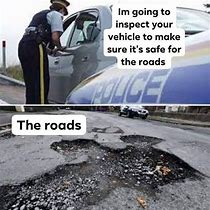- Joined
- Dec 18, 2019
- Messages
- 6,538
Another year, another failed NH motor vehicle inspection. This time is was for one wiper blade that had a 5mm, I kid you not, tear in the rubber at the end of the blade. It was raining on the way to the inspection, the darned wipers were working fine. Strike one. Kind of felt that was a low blow, but not a difficult fix. The second strike was for my front brakes. Now that is a safety issue, if true.
Can't tell exactly what the fail is for though. They provided a classic craigslist photo, you know some sort of blurry thing that somehow means something to the photographer and no one else. I think the fail is for an "elevated ridge" at the very outer edge of the rotor. At least on the outside edges, the ridge is minimal, like 1mm wide and not very high, which is (in my opinion) not a big deal. I'll pull the wheels tomorrow and take a look. Maybe the insides of the rotors aren't good.
What I can't find is an actual rule on the state DMV site that gives a standard for this. All that I could find was https://www.gencourt.state.nh.us/rules/state_agencies/saf-c3200.html There's no mention of ridges, nor minimum acceptable swept area. They do refer to the manufacturers specifications. In the service manual for my car, in the brake inspection section, they only call out run out and rotor thickness. Neither were called out for failure. And the rotor thickness is measured 10mm away from the edge, which to me seems to allow for a ridge. Assuming the micrometer has a 6mm contact diameter, then that would allow for up to a 7mm ridge. That's larger than I'd like, but the service manual is silent on the matter. Don't see any other specifications to measure.
Yeah I'm venting. Tomorrow I will have pictures and measurements. Maybe I'll find something that I need to repair, but inspection from the exterior, nothing looks wrong. (Actually they looked really good, which is why I was so surprised.) Yeah, they wanted about $700 for the front brake job. Declined their kind offer. I will do it for less. Supposedly I get a free inspection, if done within 30 days. If the weather holds out, and I am lucky it might be done tomorrow.
Last year they got me for cloudy headlights. (To me that is a manufacturing defect.) I fixed that "safety issue" in two minutes with some plastic polish. At least this year, I remembered to re-polish them. If I could find some decent, affordable UV protectant, I'd coat them. Otherwise I'll just polish them every six months. Way cheaper than spending > $800 for plastic headlights that will fade again, or some ridiculous rejuvenation service for over $300.
Getting tired of maintaining this nine year old car. We've fallen out of love. Too boring, not fun, poor mileage in the city, too many stupid issues. Want to stop putting money into it. It's my only vehicle, so I have to keep it running or get something else. In the meantime, I need to fix it and pass inspection.
Can't tell exactly what the fail is for though. They provided a classic craigslist photo, you know some sort of blurry thing that somehow means something to the photographer and no one else. I think the fail is for an "elevated ridge" at the very outer edge of the rotor. At least on the outside edges, the ridge is minimal, like 1mm wide and not very high, which is (in my opinion) not a big deal. I'll pull the wheels tomorrow and take a look. Maybe the insides of the rotors aren't good.
What I can't find is an actual rule on the state DMV site that gives a standard for this. All that I could find was https://www.gencourt.state.nh.us/rules/state_agencies/saf-c3200.html There's no mention of ridges, nor minimum acceptable swept area. They do refer to the manufacturers specifications. In the service manual for my car, in the brake inspection section, they only call out run out and rotor thickness. Neither were called out for failure. And the rotor thickness is measured 10mm away from the edge, which to me seems to allow for a ridge. Assuming the micrometer has a 6mm contact diameter, then that would allow for up to a 7mm ridge. That's larger than I'd like, but the service manual is silent on the matter. Don't see any other specifications to measure.
Yeah I'm venting. Tomorrow I will have pictures and measurements. Maybe I'll find something that I need to repair, but inspection from the exterior, nothing looks wrong. (Actually they looked really good, which is why I was so surprised.) Yeah, they wanted about $700 for the front brake job. Declined their kind offer. I will do it for less. Supposedly I get a free inspection, if done within 30 days. If the weather holds out, and I am lucky it might be done tomorrow.
Last year they got me for cloudy headlights. (To me that is a manufacturing defect.) I fixed that "safety issue" in two minutes with some plastic polish. At least this year, I remembered to re-polish them. If I could find some decent, affordable UV protectant, I'd coat them. Otherwise I'll just polish them every six months. Way cheaper than spending > $800 for plastic headlights that will fade again, or some ridiculous rejuvenation service for over $300.
Getting tired of maintaining this nine year old car. We've fallen out of love. Too boring, not fun, poor mileage in the city, too many stupid issues. Want to stop putting money into it. It's my only vehicle, so I have to keep it running or get something else. In the meantime, I need to fix it and pass inspection.


